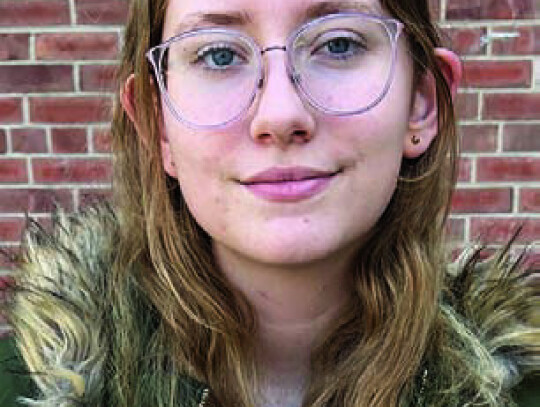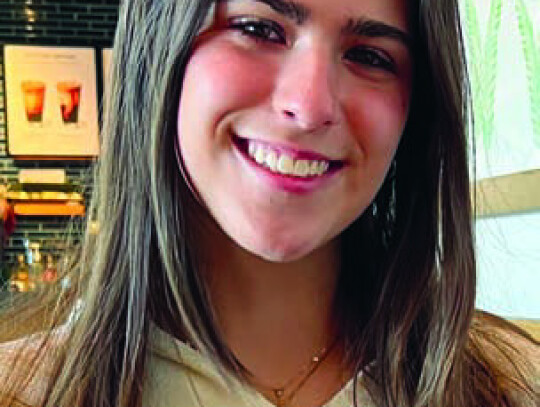Sofia Calderón, Katherine Chiparus, and Chloe Marrache are passionate about bringing awareness and commitment about the earth, its changing environment and sustainability, to other people, especially their peers.
The three Livingston High School students know that their generation will be affected by environmental events, and feel they have the ability and duty to combat climate change, said Doug Jay, who teaches the district’s Sustainability Science courses and advises the LHS Green Team.
Katherine Chiparus, Senior “Protecting the environment means awareness of what is happening, and trying to reduce your footprint,” said Chiparus. “Do little things, be consistently aware, and don’t blow it off.” She wants her peers to go beyond saying they care, while they use up a plastic water bottle every day.
She became focused on ecological problems after taking sustainability classes with Jay and becoming invested in the content. “As the environment changes, people say it will lead to eventual extinction, it affects the food and water supplies, and major die-offs,” Chiparus commented.
“The price of food would rise, there will be many who can’t afford it, causing major instability, if we don’t step in to stop these things from happening,” she said. “All the negative news about the climate makes people wonder if it is possible for things to get better. I think climate anxiety is a real thing for a lot of people.”
She is especially concerned for the animals and plants that are affected by the actions of humans.
“My magic want would be to remove the garbage and clean up their habitats. That would remove carbon from the atmosphere. It would be great,” she said. “We produce so much garbage. One day another student and I went outside and picked up trash by the senior lawn and the Madonna Field. Everyone is just chucking food boxes, coffee cups, out of their car.
“People don’t care because they don’t think it affects their lives… people lack the sight to see problems around the world. There is a bubble you are in living here, about things like social justice, too. And climate change can actually kill you.”
Still, Chiparus, a former captain of the Ocean Science Bowl, tries to stay hopeful.
“I think about what I can do in my own life,” she said, “Since I don’t think I will go into politics or become president, and change the world from that office, at least I want to learn how to grow my own food and live off the land.”
Her family and some of her friends have become more conscious and attentive about sustainability, “but others think I’m being crazy when I talk about the dangers of climate change. It’s kind of suffocating when you think about how serious the problem is.”
To reduce her waste, Chiparus does not buy many disposable items and chooses to participate in events she sees as less wasteful.
“I don’t participate in a lot of senior traditions, like making a lot of t-shirts or buying plastic yellow hats and pompoms we’re never going to use again. It’s fun, but very wasteful,” she said.
She finds it helpful being in a class with others who care about sustainability, connections she hopes to make in college.
Sofia Calderón, Sophomore “I think caring for the environment means using resources in a way that allows them to exist and regenerate for a long time, in order to preserve biodiversity and conservation for future generations of humans,” said Calderón.
She experienced a watershed moment in 2020, during the quarantine, when she was spending a lot of time at home and going to school online.
“I kind of fell down a YouTube rabbit hole,” she said. “I stumbled on one content creator in particular, and what she presented about the Mid-Atlantic seaboard. Millions of pounds of plastic garbage had accumulated, due to pollution and the ocean currents. I asked my mom, ‘Did you know that this exists? Every time we buy something plastic, we are going to be contributing to that, we have to do something.’ I kept learning new things, in order to do things differently in our household.”
Around then, Calderón chose to be vegan, concerned about what goes into producing animal products, and how the animals are treated. “It takes a lot of water to grow the grain, apply the pesticides, and clean out the processing facilities,” she said. “The livestock produce a lot of waste that contains methane, a dangerous greenhouse gas. Chemicals seep into the ground and contaminate the water. There are dead zones where nothing is living.”
She encouraged her family to use less plastic, and searched for low waste stores where they could buy food and other items with less packaging.
Her finds include a few nearby establishments, such as the Dry Goods Refillery in Upper Montclair, that sells food without plastic packaging, and the Sustainable Haus in Summit, which sells household goods like cleaning and body care items. She began working there in September.
Calderón’s top concern is thinking about her future and that of her generation, “the way that our society is going, and what it’s going to mean for the future. It’s a privilege to be able to grow your life for the future.”
At LHS, she said, students are focused on their academic performance, drowning out environmental concerns.
“It’s difficult to get people to re-focus on the larger things that are going on,” she said. “I think that has slowed down our progress and the involvement of the school community with the Green Team.”
Last year, the team participated in the Global Climate Strike to raise awareness of the issues. In March, the group held a clothing swap, for people to donate and take clothing.
The team has tried projects like putting recycling bins in each classroom, and zero waste challenges, and has raised beds for gardening projects and is looking to involve other clubs and the larger community.
Calderón would also like to integrate a composting program in the lunch system, and use re-useable utensils and dishes.
“The most impactful thing that could happen, that would show us a more positive future,” she said, “would be legislative and policy changes that stop prioritizing profit over the resources of the planet.
“I recently learned that a tree is not valuable until you cut it down; oil is not valuable until you take it out of the rocks and ground. This is not something we can keep doing. Climate scientists are predicting a point of no return if we don’t get it together.”
She is hoping to raise awareness for the issue.
“Because that’s where it starts, and where it stops,” she said. “If you’re not aware, nothing can change.”
Calderón is thinking about a career in environmental law, to support individuals and the community.
“It’s almost like professional activism,” she said.
Chloe Marrache, Junior
Marrache has long been interested in fashion and business, as well as sustainability.
“There is a lot of potential in fashion and sustainability because sustainability will be the future,” she said.
It’s something she is examining in her AP Research class, combing financial archives, drawing connections between companies that are not compliant with environmental legislation. She plans to draw conclusions and make suggestions to improve the compliance rate.
Back in ninth grade, she took an online course at Parsons School of Design to learn about the fashion industry, and started a sustainable fashion blog, “The Fashion Emphasis,” developing her own rubric to rate the sustainability of local fashion brands.
Marrache puts her ideas into practice; almost everything she wears now is secondhand. She discovered that Lululemon, for example, sells secondhand versions of its products, and she was sporting a sweater from a local Livingston store, Freestyle Consignment, when interviewed. “It’s cheaper and sustainable,” she said.
She has held sustainable swap events, and supports Remake, a sustainable fashion advocacy organization.
“Caring for the environment means seeing the impact we have on the earth,” she said. “It is so frustrating, and aggravating. Everyone kind of knows what is going on but there isn’t a huge movement to make a difference.
“My friends are not as motivated as me. Everyone recognizes that it’s an issue, but no one wants to come to terms with the fact that we really have to act now. Because there’s not that much time left before we’re actually in trouble.”
She works with Green Team, to make a difference at the school level.
Now, she is also working with the town. After she learned that the Livingston Environmental Commission had no student members, she explored the possibility, and she and another student, Aadit Pisal, were appointed.
“It’s a great opportunity to be a younger voice on the committee,” she said.
“People have a lack of urgency about this,” she said. “I feel like the longer we wait, the worse place we’ll be in. People acknowledge the issue, but their behavior suggests otherwise; they consume fast fashion, or they litter, or use a piece of plastic that they don’t recycle.”
It’s difficult not to pitch the plastic, she notes, and sustainable fashion can be more expensive.
“It’s just easier to choose the less sustainable option,” she said. “Even the smallest differences that the community makes can make a big difference.”
Marrache is optimistic about new technologies, like carbon capture and storage carbon sequestration, which she studied last summer in a sustainable enrepreneurship program at Dartmouth University.
Still, she said, “I hope that people will come to terms with the idea that we need to act now to avoid catastrophe.”




